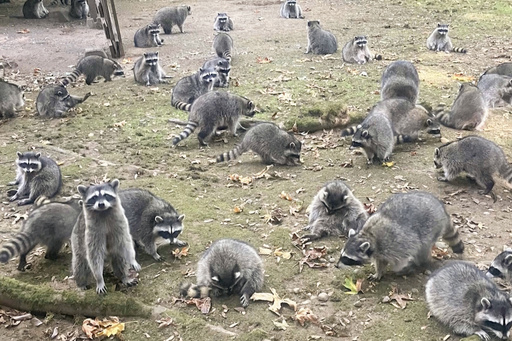In Kitsap County, Washington, deputies routinely manage calls regarding animal issues such as stray livestock or troublesome dogs. However, a recent emergency call from a resident near Poulsbo involving a massive group of raccoons drew particular attention.
The woman reported that she had been forced to leave her home due to an overwhelming presence of raccoons—between 50 to 100—who were exhibiting aggressive behavior. According to Kevin McCarty, a representative of the sheriff’s office, this situation escalated after the woman had been feeding a family of raccoons for years. It wasn’t until roughly six weeks ago that the raccoon population near her property surged dramatically.
“She indicated that the raccoons became increasingly insistent, seeking food at all hours. They would scratch at her home and surround her vehicle whenever she approached,” McCarty explained. “They viewed her residence as a reliable source of nourishment, causing them to return frequently as they anticipated being fed.”
The exact reasons behind the sudden increase in the raccoon population remain unclear. Investigations from both the sheriff’s office and the Washington Department of Fish and Wildlife concluded that no regulations had been breached. McCarty noted, “This situation arose from the woman’s actions, and she needs to find a resolution.” Footage captured by law enforcement depicted numerous raccoons scattered among trees, with deputies confirming the presence of a large group during their visit.
Bridget Mire, another spokesperson for the Washington Department of Fish and Wildlife, pointed out that state laws prohibit the feeding of larger carnivores, such as bears and cougars. While some local jurisdictions may have specific regulations against feeding other types of wildlife, state laws currently do not restrict this practice. Nonetheless, the department strongly advises against feeding wild animals. For instance, raccoons can carry diseases, and providing them with food may inadvertently attract other predators, like coyotes and bears.
Fortunately, a wildlife conflict specialist from the agency has consulted with the woman, who has ceased feeding the raccoons. Mire reported that the raccoons appear to be dispersing now that they are no longer receiving food. “We are pleased to see a positive resolution to this situation,” Mire stated.
Poulsbo is located approximately a 90-minute drive and ferry ride northwest of Seattle.



